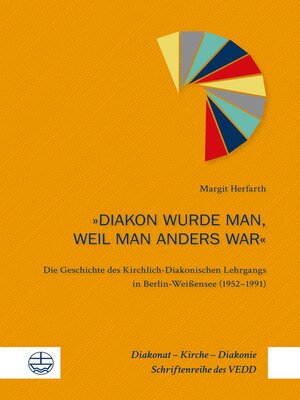"Diakon wurde man, weil man anders war"
ebook ∣ Die Geschichte des Kirchlich-Diakonischen Lehrgangs in Berlin-Weißensee (1952–1991) · Diakonat – Kirche – Diakonie
By Margit Herfarth

Sign up to save your library
With an OverDrive account, you can save your favorite libraries for at-a-glance information about availability. Find out more about OverDrive accounts.
Find this title in Libby, the library reading app by OverDrive.



Search for a digital library with this title
Title found at these libraries:
| Library Name | Distance |
|---|---|
| Loading... |
Nach der deutschen Teilung war die gemeinsame Ausbildung von ost- und westdeutschen Diakonenschülern in Berlin unmöglich geworden. Stattdessen blieben die einen im Johannesstift, die anderen lebten und lernten in Weißensee, wo in der heutigen Stephanus-Stiftung ein neues Brüderhaus als Ausbildungsstätte eingerichtet wurde. Dieser Band zeichnet die spannungs- und konfliktreiche Geschichte des Kirchlich-Diakonischen Lehrgangs (KDL) nach, der junge Christen – und später auch Christinnen – im Kontext der DDR-Gesellschaft dazu befähigte, gegen viele Widerstände Diakonie als Hinwendung zu den Menschen "am Rande" auszuüben. ["You Became a Deacon Because You Were Different": The History of the Kirchlich-Diakonischer Lehrgang in Berlin-Weißensee (1952–1991] After the partition of Germany, it had become impossible to train East and West German students of deaconry together. While the latter remained at the Johannesstift, the former lived and studied at a new training facility – known as a "Brüderhaus" – that had been established at the Stephanus Foundation in Weissensee. This book charts the history of a school which, although fraught with tension and conflict, enabled young male (and later female) Christians – despite the numerous obstacles posed by the East German political and social order – to devote themselves to Christian social work and care for those "on the fringes" of society.







